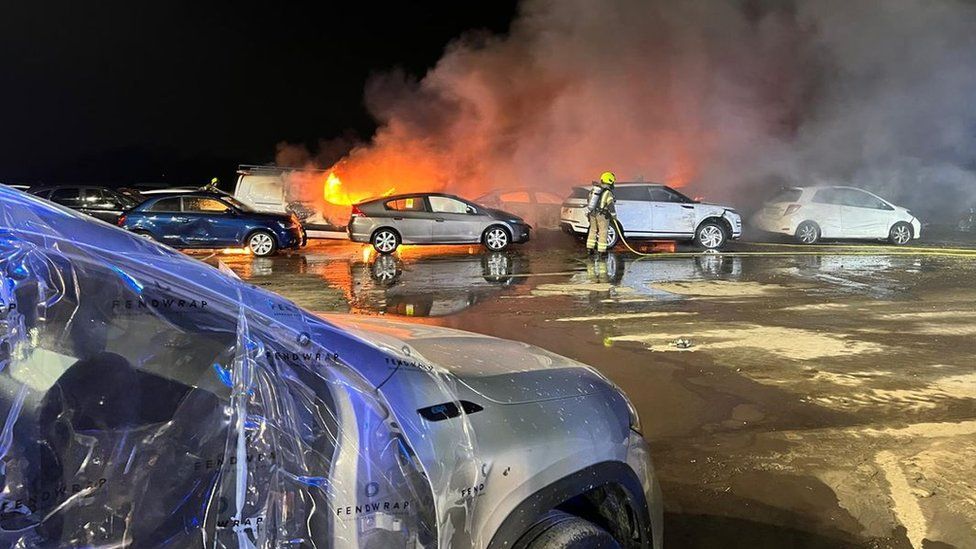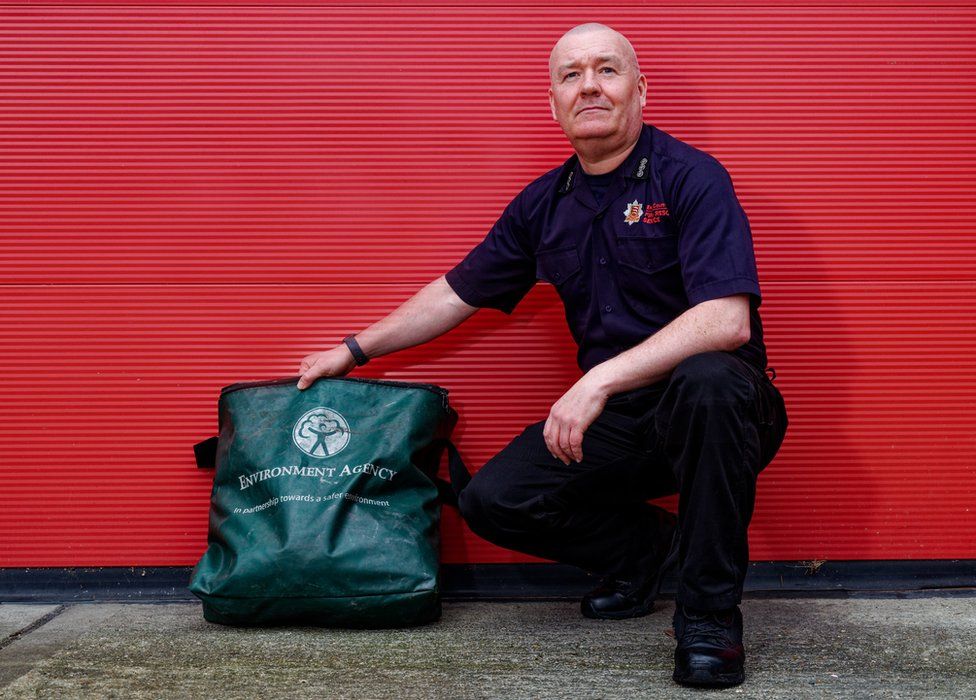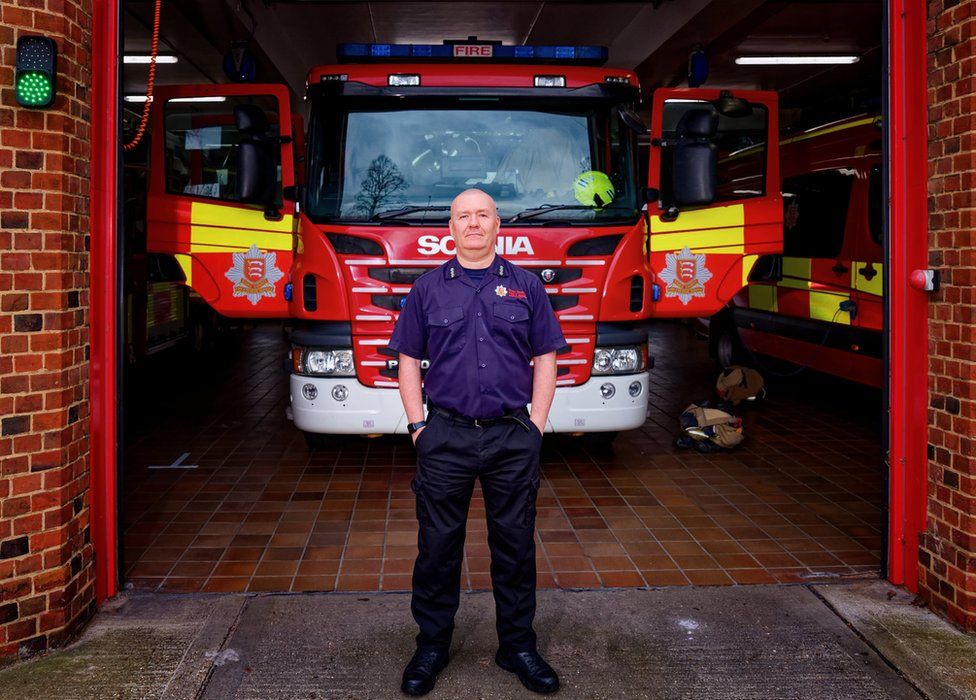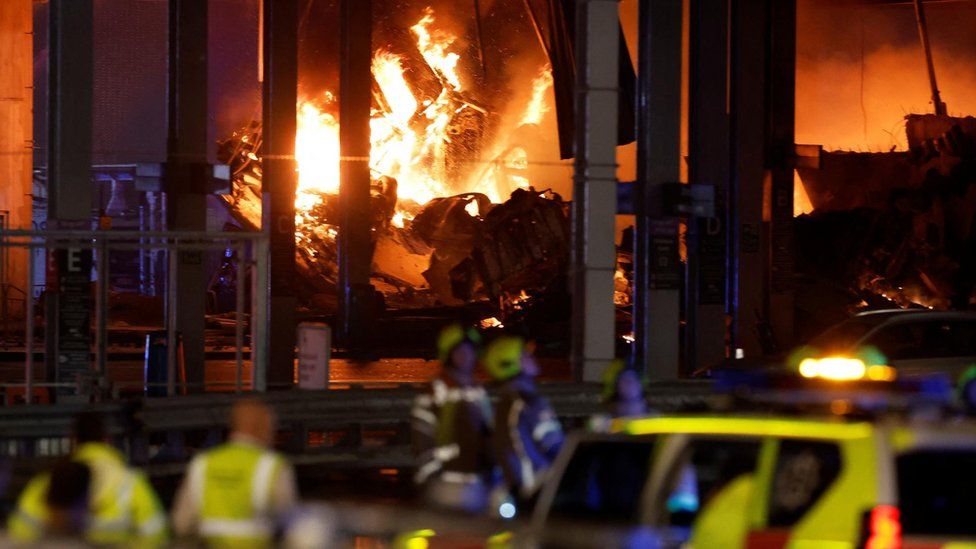 Image source, Essex Fire and Rescue Service
Image source, Essex Fire and Rescue Service Each year, Essex Fire and Rescue Service focuses on one area of "top-up" training for its crews. In recent years, this has included sessions on firefighting at height and managing hazardous materials. This year, a new course is being introduced: How to deal with electric vehicle fires. Why?
Station manager Terry Maher has recently taken on a new role within the fire service.
A hazardous material expert, he is now the service's lead officer on tackling lithium-ion battery fires.
His new responsibility comes as the number of electric vehicles (EVs) on UK roads hits more than 540,000. And the number is rising fast.
And while Mr Maher stresses EV fires are rare, they pose a challenge quite unlike a conventionally-fuelled vehicle fire.
The batteries – the source of the fire – are often hard to reach, he says, and EV fires can create directional jet flames and vapour cloud explosions.

EV fires also create a variety of toxic chemicals both in the air and in the water run-off if firefighters use hoses to keep the flames in check.
"Our preferred approach is to let them burn themselves out," says Mr Maher.
Not all recovery companies will take damaged cars away, says Mr Maher, either because they are concerned about handling a burned EV or because they do not have the right recovery vehicles (EVs cannot be towed, because the turning of the back wheels generates power).
In one incident last year involving a Tesla, police and firefighters had to wait more than four hours for a specialist recovery vehicle to arrive.
Electric cars are also known to reignite "up to two or three weeks after the initial fire", says Mr Maher, meaning they have to be "quarantined" away from other vehicles even after the fire appears to have been put out.

"Dealing with a petrol or diesel car fire would normally take about 30 minutes," he says. "With an EV fire we're looking at four or five hours or longer, if we've used water.
"As more and more people use electric vehicles we can expect more and more electric vehicle fires."
What exactly this means for fire services is unclear, however – not least because of the paucity of available data.
When the BBC asked every fire service in the UK how many EV fires they had dealt with in the past three years, none could provide a reliable answer because they do not distinguish them from other types of vehicle fires.
Instead, some fire services, such as those in Norfolk, Essex, Surrey, Derbyshire and Kent, ran text searches for any reference to the word "electric" in their vehicle fire records.
The results of those text searches show there were 59 electric vehicle fire references in 2022-23 across England – up from 30 the previous year.
The true figure, says Mr Maher, is likely to be about double that.
He says Essex fire service has started recording all lithium battery fires by type so that it can better understand the issues they pose and to help plan for the future.
When the BBC raised the issue of fire services not recording EV fires specifically, a Home Office spokesperson said: "We are reviewing the incident reporting system and considering the collection of data on fires involving lithium-ion batteries, electric vehicles, e-scooters and e-bikes."
 Image source, Getty Images
Image source, Getty ImagesLast summer, the Office for Zero Emission Vehicles produced a guidance paper on dealing with EV fires in confined spaces such as car parks.
The document said that while car fires were "less likely to occur" in EVs than in hybrid, petrol or diesel vehicles, this would "need to be monitored as fire risk may increase as cars age and as EVs become more affordable to a wider range of drivers".
It also recommended car parks increased the spacing between electric vehicles to reduce the risk of fires spreading between vehicles.
Mr Maher says the issue of spacing around EVs is likely to become increasingly pressing as ownership increases.
 Image source, Reuters
Image source, ReutersWhile not started by an electric vehicle, the fire at Luton Airport last year did end up involving EV, he says, and laid the bare the potential consequences of fires spreading from one vehicle to another.
He says he is in discussions with Stansted Airport about measures it can take regarding parked electric vehicles.
Riccardo la Torre, national officer at the Fire Brigades Union, says tackling battery fires is a "complex and difficult" task.
"Battery fires present another growing risk for our shrinking fire service to handle," he says.
"With the progression of greener technologies, electric vehicles are becoming increasingly common on our roads. This means more batteries, and therefore an increase in battery fires.
"Tackling these intense fires is a complex and difficult operation for firefighters. Each of these incidents requires significant time and resources. But with close to 12,000 firefighter jobs cut since 2010, our service is already seriously overstretched.
"We urgently need the government to invest in our fire service so that firefighters have the resources they need to safely tackle new hazards such as electric vehicle fires.
"We need research into battery storage and fires, and specialised training and equipment to tackle them. Battery manufacturing, usage and storage must be properly regulated to keep our communities and firefighters safe."
The Home Office said: "The government is committed to ensuring fire services have the resources they need to keep the public safe and in 2023-24 they will receive around £2.6bn."
The BBC contacted the Society of Motor Manufacturers and Traders for comment but received no response.

Follow East of England news on Facebook, Instagram and X. Got a story? Email eastofenglandnews@bbc.co.uk or WhatsApp 0800 169 1830




